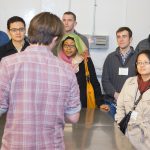By Nadir Vissanjy, MPP’14, Correspondent
Having lived in San Francisco for three years, I had assumed that the ‘Dubin San Francisco Field Visit’ that I, along with 23 other Harvard Kennedy School (HKS) students, participated in during the week of Jan. 15, would consist of the standard fare – the Golden Gate Bridge, Mission District, Alcatraz, bacon-wrapped hot dogs, etc.
In its place, we found an inspiring culture, resilient activists and an infectious innovative spirit throughout the Bay Area. All told, we visited 18 enterprises in three days (yes, three days), each addressing a social need with its own unique model.
The trip was funded by the Center for Public Leadership’s Dubin Program for Emerging Leaders, which annually sends a cohort of HKS students to explore a US city and learn about public, private and nonprofit enterprises committed to improving their community.
Each stop had its own lesson to instill; these transcend the neighborhood. Regardless of your post-HKS path, our desire to serve can benefit from the principles these organizations represent:
1. Don’t fear failure. Never have I seen people embrace failure so much; it is almost like they plan to fail! And they do. But they don’t let the story end there. They fail because they translate their wild vision into action, and only through reflection are they able to adjust goals and persevere. Kiva’s cofounder Matt Flannery explained that as the microfinance Web site grew, fraud was pervasive. As a mission-driven group, they were transparent with investors about their shortcomings and re-tooled the organization’s lending practices to mitigate fraud. Kiva doesn’t ignore failure. Their annual reports, in fact, list their mistakes each year and they continue to grow because of the trust and commitment that transparency instills in their lenders.
2. Synergy is not a buzzword. As we made our way around San Francisco, Oakland and Palo Alto, we were introduced to a variety of organizations with varying models directed toward the same end. For instance, the California Endowment foundation provides community-based health organizations with support to build healthy communities. At the same time, Peer Health Exchange enlists college students to teach high school students how to make healthy decisions. While the organizations choose different tactics, their work toward a
healthier society creates synergy and compounds their success.
3. Doing well while doing good. Those interested in entering, or returning to, the private sector are often boxed into the world of consulting or financial services. Well, San Francisco demonstrated that with a sense of purpose and creativity, an enterprise can flourish. Revolution Foods sought to provide healthier student lunches at competitive prices. They produce all-natural, tasty options for schools that meet the public school district’s subsidy rate, thus eliminating the prime deterrent to healthy foods. Six years ago, they made 600 meals a day and today they serve 50 million meals annually to students in eight states and the District of Columbia.
4. Accountability can be empowering. The Delancey Street Foundation is a leading residential self-help organization, comprised of former substance abusers, ex-convicts, homeless persons and others who have hit rock bottom. Funding their own operations through a collection of enterprises and governing themselves by means of an elaborate system of hierarchy, this 370,000 square foot waterfront compound is all structured and executed by the residents. They empower each other, hold each other accountable, and support each other’s quest for a better life. The Foundation operates the compound, five restaurants, and the largest independent moving company in Northern California. It’s the kind of operation that only exists in theory, yet here it is, decades later, graduating participants at a rate that inverts the national rate of recidivism.
As we endeavor to shape public policy, we can play it safe by being risk-averse, but the Bay Area teaches us that taking a risk is better than wondering ‘what if’. The work we do is not done in a vacuum, but rather intricately interlaced—immigration reform affects education as much as health, urban planning and social services. Most importantly, the work that the Delancey Street Foundation does to assist those who have hit
rock bottom to ‘pull themselves up by the bootstraps’ through a supportive and empowering environment is inspirational for the work we will do as public servants.
I do not know what it means to have had my best Harvard experience outside of Harvard, but I know the lessons that we learned on the Dubin Field Visit can be applied to all the challenges we continue to tackle.
You can check out the photos of our experience at http://bit.ly/SFDubin



